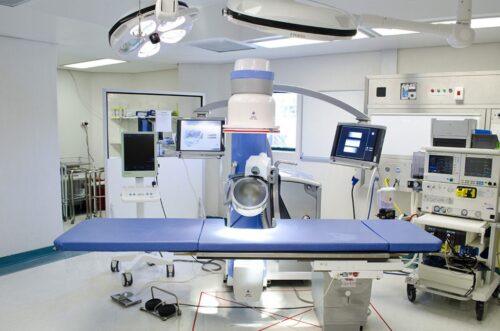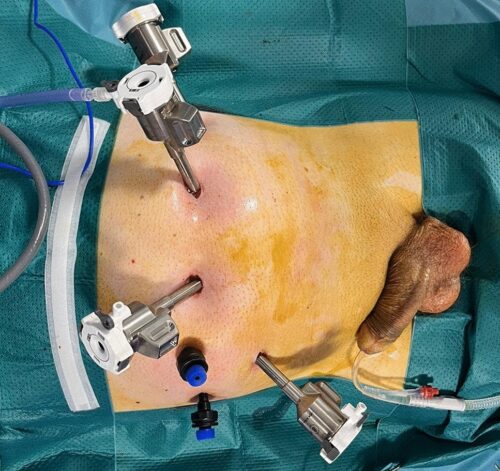So many people have been making enquiries online and offline if we have Doctors that carry out Laparoscopic surgery in Nigeria. First, what is Laparoscopy? Laparoscopy is a type of surgical procedure that allows a surgeon to access the inside of the abdomen (tummy) and pelvis without having to make large incisions through the skin.
It is also called keyhole surgery or minimally invasive surgery. During laparoscopic procedures, small holes are made in the tummy through which a camera and other instruments are introduced to perform surgeries.
Because the surgeon uses an instrument known as a laparoscope, large incisions can be avoided during laparoscopy.
This is a small tube with a camera and a light source that shows images of the inside of the pelvis or abdomen on a television monitor.
Utilizing laparoscopy
A variety of conditions that originate within the abdomen or pelvis can be better understood with the assistance of laparoscopy. It can also be used for surgery to remove an organ that is damaged or ill or to take a tissue sample for further testing (biopsy).
The most common uses of laparoscopy:
One of the main reasons why people make enquiries about Laparoscopic surgery in Nigeria is that the want to know the most common uses of laparoscopy. Below are some of it’s uses;
gynaecology: It is the study and treatment of diseases affecting the female reproductive system
gastroenterology: It is the study and treatment of diseases affecting the digestive system
urology: It is the study and treatment of diseases affecting the urinary system.
How to perform laparoscopy
Because laparoscopy is performed under general anaesthesia, you won’t feel any pain.
The surgeon makes one or more small incisions in the abdomen during laparoscopy. The laparoscope, small surgical instruments, and a gas pumping tube can all be inserted into the abdomen with these. The surgeon can more easily look around and perform the surgery as a result of this.
The gas is expelled from your abdomen following the procedure, stitches are used to close the incisions and it is dressed.
Although you may need to spend the night in the hospital, you can frequently return home on the same day as your laparoscopy.
If you want to perform Laparoscopic surgery in Nigeria you should expect that there could be some complications. These complications could be minor or major.
Below are some of the complications that can occur.
Minor complications
Minor complications are estimated to occur in 1 or 2 out of every 100 cases following laparoscopy. They include:
- infection
- minor bleeding and bruising around the incision
- feeling sick and vomiting
Serious complications
One in every 1,000 cases of laparoscopy is thought to result in serious complications.
They consist of; A blood clot developing in a vein, typically in one of the legs (deep vein thrombosis, or DVT), which can break off and block the blood flow in one of the blood vessels in the lungs.
It can cause damage to an organ, such as your bowel or bladder, which could result in the loss of organ function. It can result in damage to a major artery.
Complications could arise from the use of carbon dioxide during the procedure, such as the gas bubbles entering your veins or arteries.
What are the benefits of Laparoscopic surgery?
Nigerias ask about Laparoscopic surgery in Nigeria majorly because they are interested in the benefits. They want to know how they can benefit from the service.
Below are some of the benefits of Laparoscopic surgery in Nigeria;
Working this way has several advantages compared with traditional surgery. Because it involves less cutting:
- You have smaller scars.
- You get out of the hospital quicker.
- You’ll feel less pain while the scars heal, and they heal quicker.
- You get back to your normal activities sooner.
In addition, here’s an illustration. In the traditional approach, intestinal surgery may necessitate hospitalization for up to a week, and recovery time may range from four to eight weeks. If you have laparoscopic surgery, you may only need to stay in the hospital for two nights and recover in two or three weeks. Additionally, a shorter hospital stay typically has a lower cost.
Advanced Kinds of Laparoscopic Surgery
The surgeon may be able to insert the camera and the surgical instrument into the same skin opening during some procedures. This results in fewer scars. However, the close proximity of the instruments makes it more difficult for the surgeon.
In other instances, the surgeon may choose to use a hand-held instrument. This procedure is known as “hand-assisted” laparoscopy. The skin cut must be longer than a half-inch long, but it can still be smaller than in conventional surgery. For the liver and other organs, this has made laparoscopic surgery possible.
Robots can help
The medical team can use technology to be more precise. As with traditional laparoscopic surgery, the robotic version requires the surgeon to first make a cut in the skin before inserting the camera. They set up the mechanical arms of a robot, not the surgical instruments. Then, at that point, they move to a PC close by.
Many surgeons believe that gynaecology and urology surgeries, as well as operations on people who weigh a lot, can benefit most from robotic surgery. Robots are used in most prostate removal procedures.
The monitor provides the surgeon with a magnified, three-dimensional, high-resolution image of the body during robotic surgery. They use hand controls to control the robot and surgical instruments as they watch the screen. The surgeon can be more precise as a result, resulting in less trauma to your body and less bleeding. You might also experience less pain after the surgery.
Some of the Surgeries we perform through keyholes at Eleos Specialist Hospital include Surgeries for Hernias, appendicitis, gallbladder stones, renal cysts, varicoceles, ovarian cysts etc.
At Eleos Specialist Hospital we have very good Doctors that handle These surgeries. See our contact information here. Our phone numbers are also pointed out below. Feel free to call us for your consultation section.
For further information contact us on:
08033103165; 08163666022


